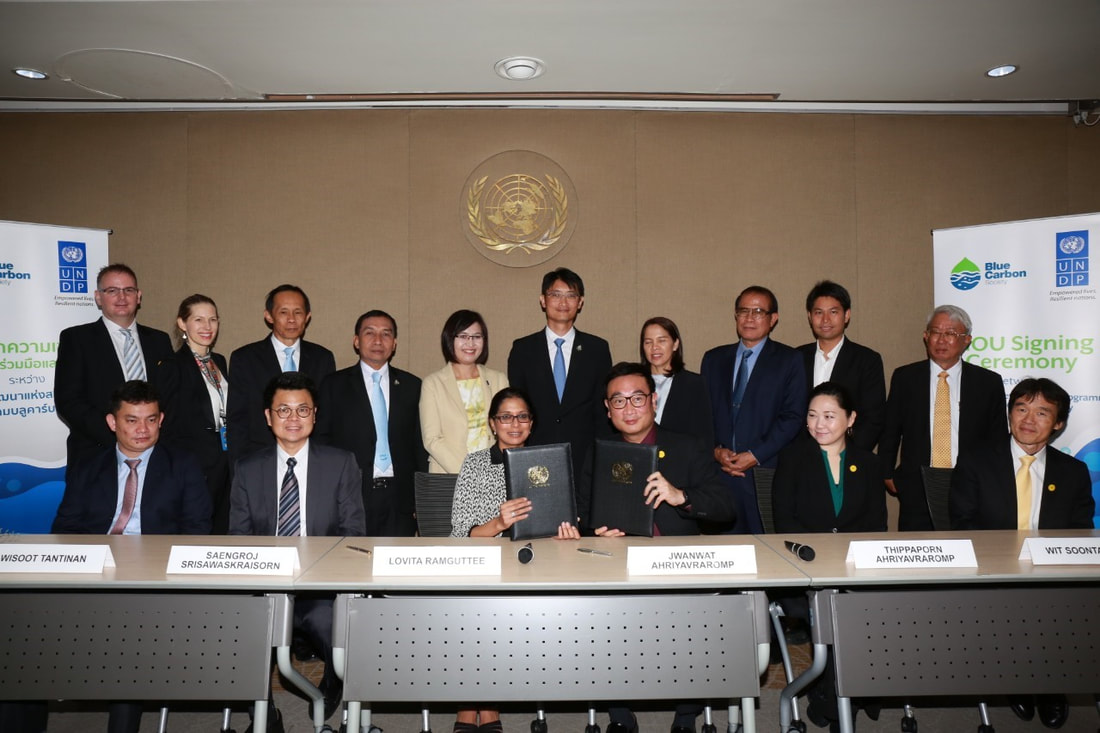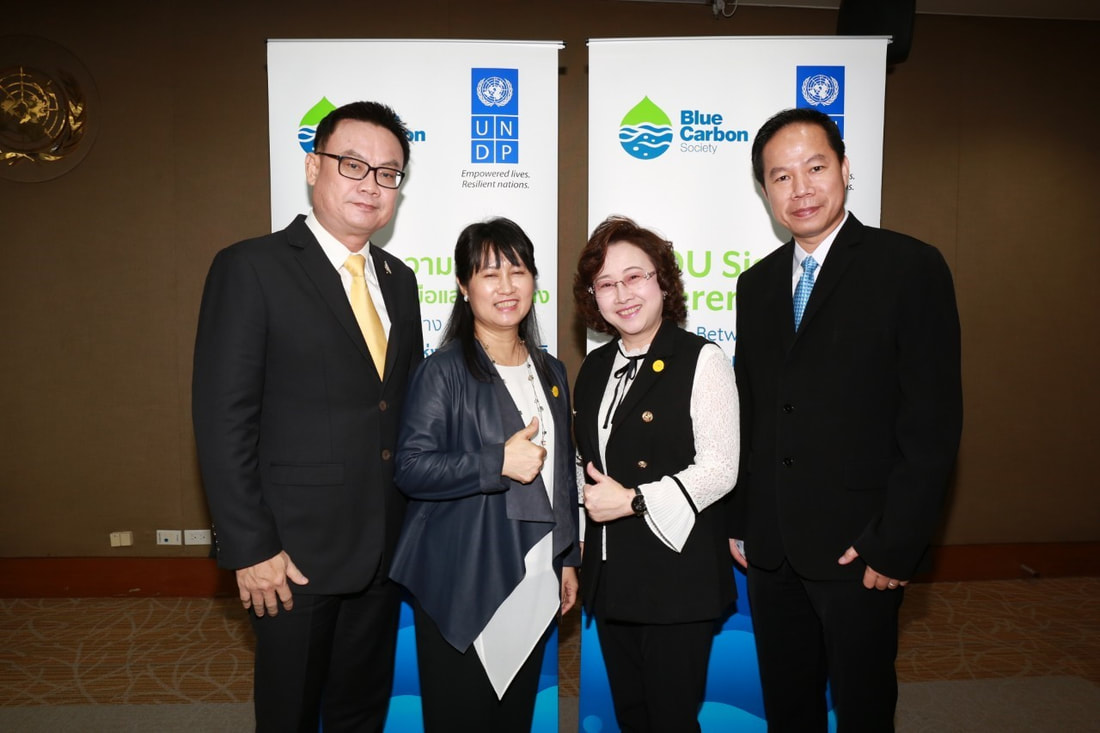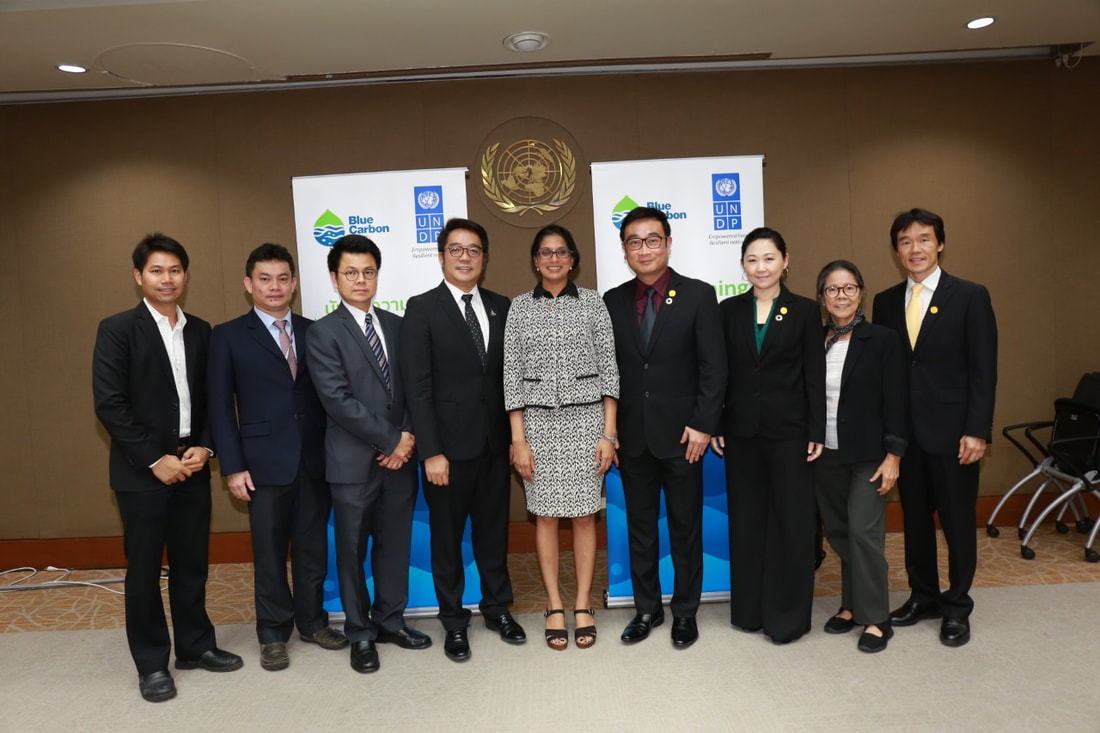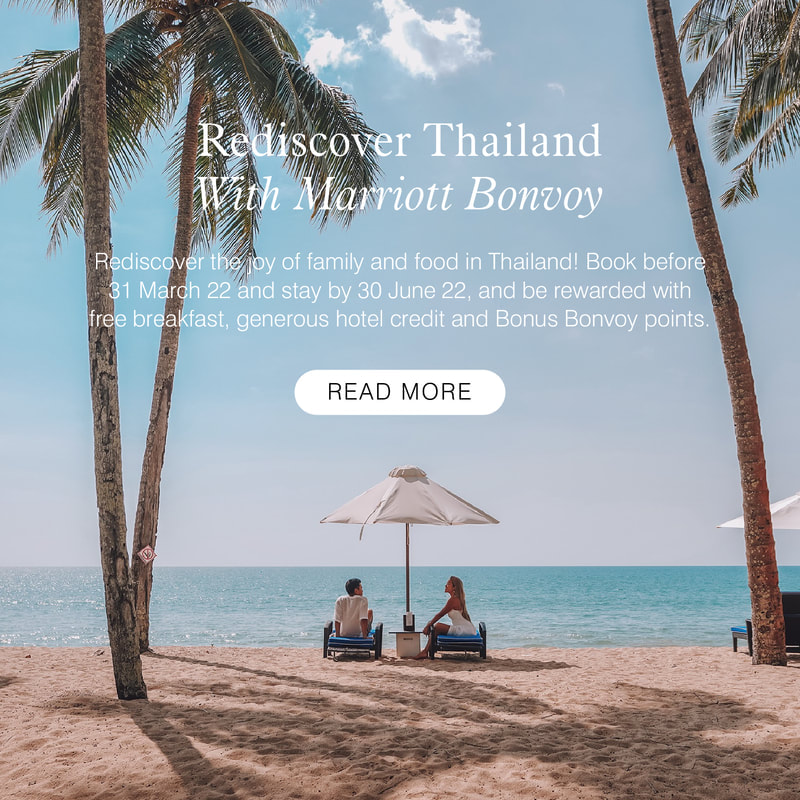Blue Carbon Society (BCS) signed a Memorandum of Understanding (MOU) with the United Nations Development Programme (UNDP) at the United Nations Conference Centre (UNCC) to develop a masterplan to sustainably nurture 24 km2 of mangroves in the western Thai province of Phetchaburi.
Phetchaburi is home to one of the world’s most biodiverse marine environments. But urbanization and coastal activities such as salt farming have had mixed impacts on coastal ecosystems. To date, 17% of the province’s mangroves remain untouched.
Blue Carbon Society’s co-founders, Dr. Jwanwat and Mrs. Thippaporn Ahriyavraromp, said the masterplan would aim at sustainable well-being for people as well as plants and animals.
“The partnership will find ways for humans and the rest of nature to co-exist happily,” said Dr. Jwanwat.
“Mangrove forests not only serve the well-being of our planet. They are also vital for local communities. Biodiversity-rich mangroves are nurseries and hatching grounds for species that are key resources for fishery and tourism. A key goal of the masterplan is thus to empower local communities to be custodians of their mangroves.”
Phetchaburi is home to one of the world’s most biodiverse marine environments. But urbanization and coastal activities such as salt farming have had mixed impacts on coastal ecosystems. To date, 17% of the province’s mangroves remain untouched.
Blue Carbon Society’s co-founders, Dr. Jwanwat and Mrs. Thippaporn Ahriyavraromp, said the masterplan would aim at sustainable well-being for people as well as plants and animals.
“The partnership will find ways for humans and the rest of nature to co-exist happily,” said Dr. Jwanwat.
“Mangrove forests not only serve the well-being of our planet. They are also vital for local communities. Biodiversity-rich mangroves are nurseries and hatching grounds for species that are key resources for fishery and tourism. A key goal of the masterplan is thus to empower local communities to be custodians of their mangroves.”
Blue Carbon Society commits on implementing this 3 year-year project in collaboration with UNDP. The initiative is expected to complement the development plan of the Department of Marine and Coastal Resources (DMRC) under Thailand’s Ministry of Natural Resources and Environment.
The Masterplan project aims to create a world-class ‘Urban Mangrove Forest Showcase’ at East Bang Taboon. This showcase will turn 400,000 sqm of mangrove forest into an inspiring model of ecotourism and sustainable development. Reclamation here will also tackle river-borne plastic waste, which is known to harm marine animals such as Bryde’s whales. The project includes a further ‘pilot’ reclamation at Pak Thale to find ways to sustainably rehabilitate salt farm areas.
Ms. Lovita Ramguttee, UNDP Resident Representative a.i., said the project could provide huge benefits for Thailand’s coasts and seas.
“The Masterplan will address the biggest barriers to preserving critical coastal ecosystems,” she said.
“We need to involve local communities and local government in developing and implementing the project from the start. UNDP can play an important role in engaging stakeholders locally and globally in knowledge sharing and implementation. These efforts will contribute to the achievements of the Sustainable Development Goals (SDG), especially SDG 13 (Climate Action), SDG 14 (Life below Water) and SDG 15 (Life on Land).”
Blue Carbon Society and UNDP will work with local stakeholders, public bodies, and experts from MQDC’s Research & Innovation for Sustainability Center (RISC) and DTGO Corporation Limited’s Urban Action Team in implementing this project.
The agreements to create the Masterplan were signed for Blue Carbon Society by Dr. Jwanwat and Mrs. Thippaporn Ahriyavraromp, its President and Vice-President, and by Dr. Wit Soontaranun, Director and Treasurer.
UNDP was represented by Ms. Lovita Ramguttee, Resident Representative a.i., and Mr. Saengroj Srisawaskraisorn, Team Leader of UNDP Inclusive Green Growth and Sustainable Development Unit.
#MQDC #ForAllWellBeing
The Masterplan project aims to create a world-class ‘Urban Mangrove Forest Showcase’ at East Bang Taboon. This showcase will turn 400,000 sqm of mangrove forest into an inspiring model of ecotourism and sustainable development. Reclamation here will also tackle river-borne plastic waste, which is known to harm marine animals such as Bryde’s whales. The project includes a further ‘pilot’ reclamation at Pak Thale to find ways to sustainably rehabilitate salt farm areas.
Ms. Lovita Ramguttee, UNDP Resident Representative a.i., said the project could provide huge benefits for Thailand’s coasts and seas.
“The Masterplan will address the biggest barriers to preserving critical coastal ecosystems,” she said.
“We need to involve local communities and local government in developing and implementing the project from the start. UNDP can play an important role in engaging stakeholders locally and globally in knowledge sharing and implementation. These efforts will contribute to the achievements of the Sustainable Development Goals (SDG), especially SDG 13 (Climate Action), SDG 14 (Life below Water) and SDG 15 (Life on Land).”
Blue Carbon Society and UNDP will work with local stakeholders, public bodies, and experts from MQDC’s Research & Innovation for Sustainability Center (RISC) and DTGO Corporation Limited’s Urban Action Team in implementing this project.
The agreements to create the Masterplan were signed for Blue Carbon Society by Dr. Jwanwat and Mrs. Thippaporn Ahriyavraromp, its President and Vice-President, and by Dr. Wit Soontaranun, Director and Treasurer.
UNDP was represented by Ms. Lovita Ramguttee, Resident Representative a.i., and Mr. Saengroj Srisawaskraisorn, Team Leader of UNDP Inclusive Green Growth and Sustainable Development Unit.
#MQDC #ForAllWellBeing






















